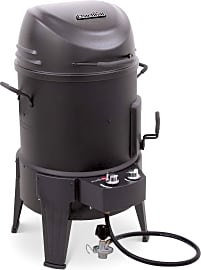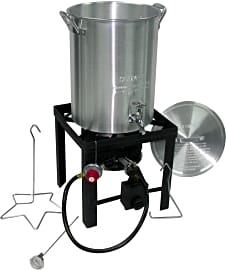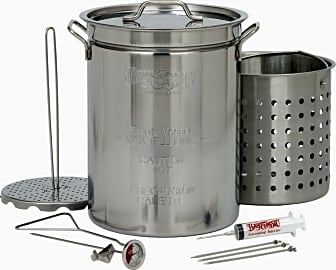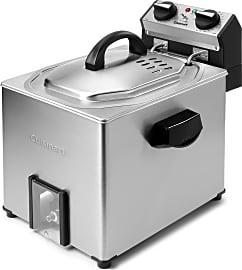The 6 Best Turkey Fryers

This wiki has been updated 40 times since it was first published in April of 2015. While cooking poultry in the oven is common when preparing everyday or holiday meals or, for a change of pace and a delicious flavor, you might want to try one of these versatile turkey fryers. Available for both indoor and outdoor use powered by either electricity or propane gas, they can handle a lot of meat at once, but be very careful when using them outdoors due to the risk of fire. When users buy our independently chosen editorial recommendations, we may earn commissions to help fund the Wiki.
Editor's Notes
April 17, 2020:
First and foremost, it's not only important to be careful around hot oil, it's also imperative to exercise extreme caution when using open flames outdoors. A huge vat of oil sitting on top of a burner is significantly more dangerous than a standard grill, and especially in the case of turkey fryers, there's an inherent risk of the pot tipping over and spilling highly flammable oil everywhere. We're not going to say you should never use one, as it can be done safely, but if you want to fry a turkey using a traditional pot-and-burner setup, you should basically consider a fire extinguisher to be an absolute requirement. Additionally, you'd do well to make certain that you're cooking on a firm, stable, and non-flammable surface such as concrete in order to minimize the risk of toppling.
With that said, those most common turkey fryers are relatively simple. Like the Bayou Classic Big Bird, made of thick steel, and the Kamp Kitchen TF2005, made of not-so-thick aluminum, they consist of a burner, a pot, a perforated base to affix the turkey to, and a few other helpful tools. If you already have a good burner on hand, the Bayou Classic 1118 contains everything else you need, possibly aside from some twine.
Alternately, you can look for an electric turkey fryer. Above all else, these are cleaner, and because they don't have any open flame, they can be used inside safely. The Butterball XL is a great example of a reliable electric model with a relatively large capacity. The Cuisinart CDF-500 is quite a bit different; rather than dunking the entire bird into hot oil, it acts like a rotisserie, which gives you the deliciousness of fried food but doesn't pack it with quite so many calories. If you're focused specifically on a decent tool for cooking large poultry indoors and not so attached to the frying part, consider a standalone roaster oven, which, unlike a standard oven, is portable and easy to clean.
We also wanted to highlight the Char-Broil Big Easy, because although it is absolutely not a fryer, it can actually be much more useful in the right hands. It's a high-powered infrared grill that easily doubles as a propane smoker and with proper care should last for many seasons of satisfying, smoky grilling.
Benefits Of Deep Frying A Turkey
Frying a turkey also frees up a lot of space in your oven for all those fantastic side dishes you have planned.
The best method of cooking a turkey has been hotly debated for years. Some feel that a fried turkey is vastly superior in flavor to that of a roasted turkey, while others wholeheartedly disagree. No matter which side of the debate you find yourself on, almost all agree that a fried turkey's skin is crispier, so if your favorite part of this beloved bird is crunchy skin, then you'll definitely want to fry your next turkey.
There are a number of less subjective benefits to frying a turkey, though. Frying a turkey is quicker than roasting one. Roasting a turkey requires roughly 15 minutes per pound for an unstuffed bird, and twenty minutes per pound for a stuffed one. That means roasting a 10-pound turkey can take anywhere from 2.5 to 3.5 hours. Frying a turkey only requires a fraction of that time. Most chefs recommend you a fry a turkey for three to four minutes per pound. This means that same 10-pound bird would take just 30 to 40 minutes in a deep fryer.
Frying a turkey also frees up a lot of space in your oven for all those fantastic side dishes you have planned. Trying to coordinate the cooking times of green bean casseroles, sweet potatoes, roasted Brussels sprouts, and corn bread while a 10-pound bird is taking up the majority of your oven is a headache most of us would rather not endure. Not to mention trying to find some time to cook your family's favorite apple or pumpkin pie. Moving the turkey outside and into a fryer completely eliminates this hassle.
While cooking holiday dinners hasn't traditionally been something men get involved in, except in certain cultures, they seem to jump at the chance to fry a turkey. There is no more macho way to cook a turkey than by inserting it into a giant vat of hot oil. More often than not, frying a turkey outdoors will become a social event, with family members and guests gathered around the fryer.
Isn't Frying A Turkey Unhealthy?
It seems like common sense that frying a turkey would make it more unhealthy than roasting one, but this isn't technically true. If the frying is done correctly, it only slightly increases the caloric and fat content. According to certified food nutritionist Michele Jacobson, a four-ounce serving of roasted turkey has 241 calories and 12 grams of fat. That same size serving of fried turkey has 253 calories and 14 grams of fat. This is a rather insignificant difference when looking at some of the health benefits a fried turkey provides over a roasted one.
Peanut oil should be your oil of choice when frying a turkey.
Dietary fats are vital to cell function, hormone and energy production, and for the body to produce healthy skin and hair. They are also essential for the body to absorb fat-soluble vitamins, such as Vitamins A, D, E, and K. Even if your body gets sufficient levels of these vitamins, it cannot absorb them if your diet lacks sufficient fat.
The type of oil being used to fry the turkey and the temperature play a large role in how healthy or unhealthy it will be. If the oil isn't hot enough, too much of it will be absorbed into the meat and skin, vastly increasing the caloric and fat content. It can also result in the skin not getting as crispy. 350 degrees is the optimal temperature to fry a turkey to prevent it from absorbing too much oil and also ensure the exterior won't burn before the inside is fully cooked. Peanut oil should be your oil of choice when frying a turkey. It has a high smoke point and is cholesterol-free, trans-fat-free, and low in saturated fats, yet high in healthy monounsaturated fats. It also provides many of the same heart benefits as olive oil.
Choosing Between A Propane Fryer And An Electric Fryer
When buying your turkey fryer, you will be confronted two different options: propane and electric models. If you have never used a turkey fryer before, you may not know which best suits your needs. As with most things in life, each of these different options comes with its own pros and cons.
As with most things in life, each of these different options comes with its own pros and cons.
Many people find electric fryers to be more convenient. All you have to do it is plug it in and add some oil, and you are ready to cook. Technically, electric fryers are designed for indoor use, as well. This means that if it is raining, snowing, or just really really cold outside, you don't have to brave the elements to have a tasty turkey for dinner. In practice though, we don't recommend using an electric turkey fryer indoors unless you want your entire home to smell like grease for days. Electric fryers are also a bit safer, though when used correctly, a propane fryer also only poses minimal safety hazards. Since an electric fryer sits on the ground or a table, rather than a stand, there is less chance of it tipping over if an errant child or pet accidentally bumps into it. They also feature an automatic safety shutoff if the oil gets too hot.
Propane fryers can only be used outdoors and require you to have enough propane on hand to get all the way through the cooking process. There is nothing worse than running out of gas while frying a turkey. If you have a grill or propane smoker, though, you should have an extra tank lying around anyways. One of the biggest advantages a propane fryer offers over an electric model is the ability to heat up quickly and better maintain the correct temperature. Any time you drop a turkey into a fryer, it will lower the oil's temperature considerably. It is important that it comes back up to the optimal temperature quickly to prevent the bird from absorbing too much oil, bringing along a lot of unwanted calories and fat. Propane fryers will heat back up to the optimal temperature faster than electric models.











